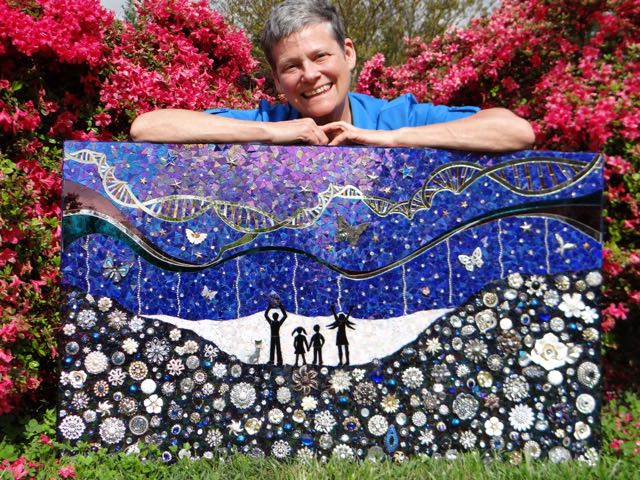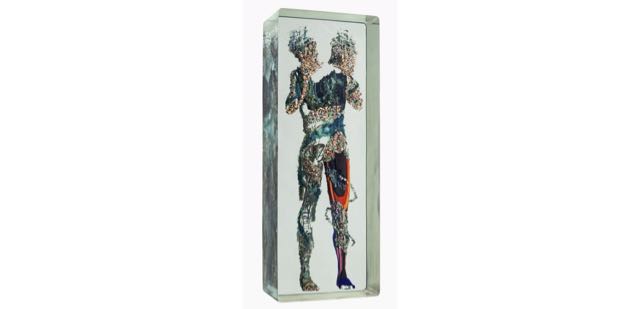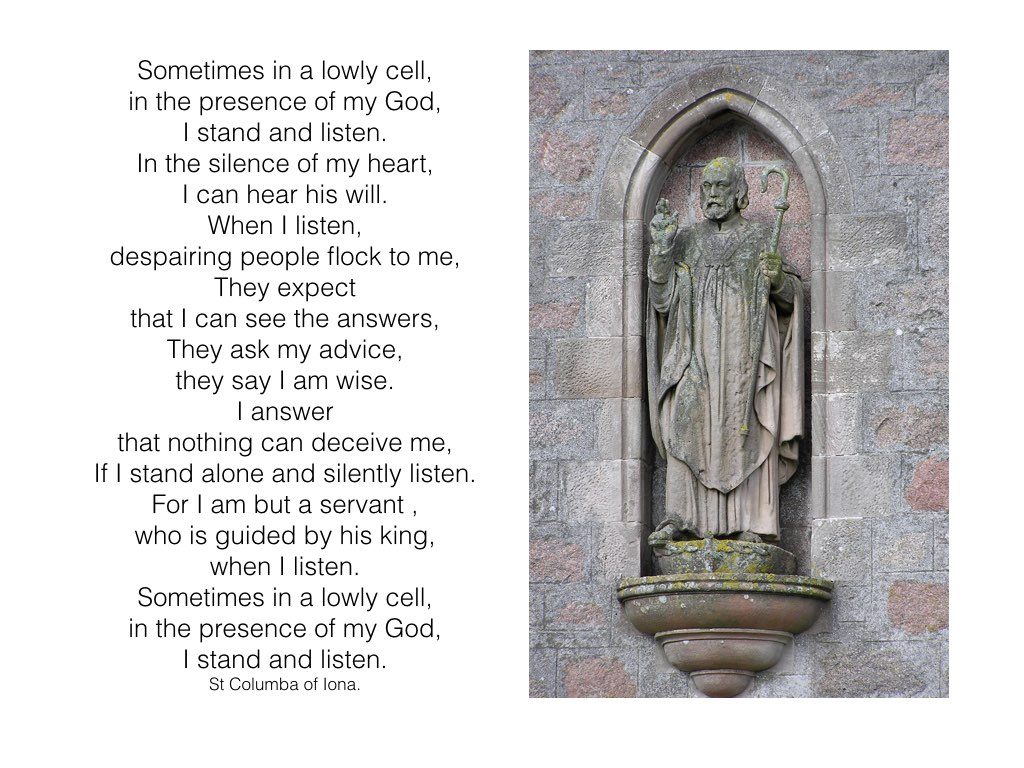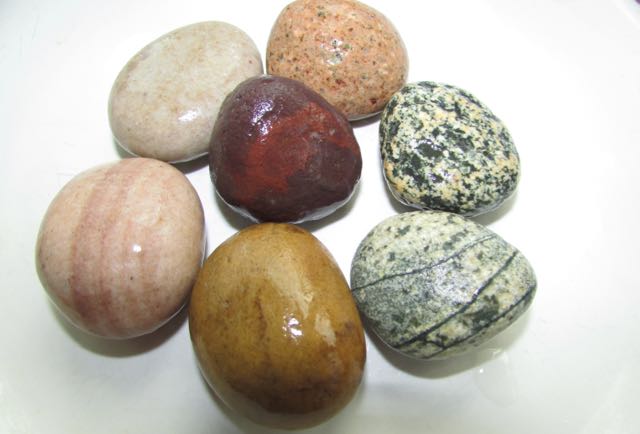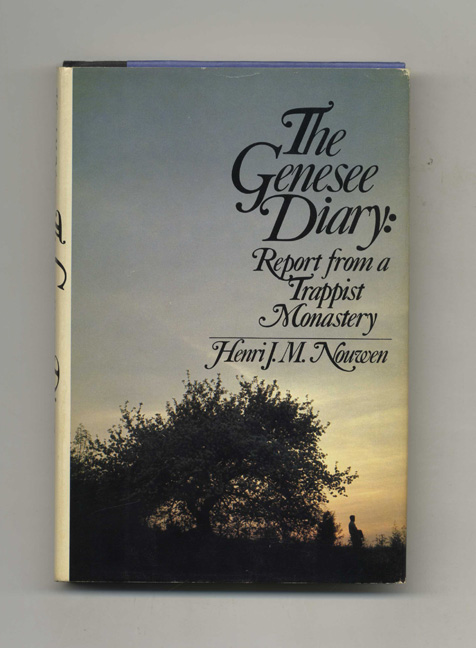
This week, in preparation for our 24th annual Celtic retreat, I have been rereading Henri Nowen‘s The Genesee Diary: Report from a Trappist Monastery. It profoundly impacted me as I read about the seven months that he spent in a Trappist monastery.
Here are a couple of passages I found particularly convicting. First this passage when early in his sabbatical Nouwen is grappling with how to make the works of his hands into a prayer and reinterpret everything in the light of what it means to live fully to the glory of God.
…living for the glory of God would make everything different. Even living for each other would then be living for the glory of God. It is God’s glory that becomes visible in a loving community. … When we indeed participate in the life of God we will always discover more of God’s mystery in each other. John Eudes described heaven as the ongoing discovery of God’s mystery by living in the most intimate presence of God and each other. The Christian life on earth is simply the beginning of this heavenly existence. (p29)
My main problem is that I have not really made prayer my priority. … much of what I am doing is motivated by many other concerns: getting back in shape, learning some manual skills, knowing more about birds and trees, getting to know interesting people… and picking up many ideas and experiences for future teaching. But if prayer were my only concern, all these other laudable things could be received as free gifts. Now, however, I am obsessed by these desires which are false, not in themselves but by their being in the wrong place in the heirarchy. (p42)
As I read this section I realized how much of what I do is with mixed motives. It is easy to say that I want to live to the glory of God and that everything I do is done to please God, yet underneath I am aware that so much of what I do is really done to please myself or to please others. I grapple with the same concerns that Nouwen does – the desire to be noticed and thought well of, the desire to be fulfilled in what I do, and even the desire to be comfortable. If I am honest I realize how easily these things can move my focus away from God and onto myself.
Even prayer can easily become self focused as I ask God for things that would make my own life easier. Healing for those I love that sometimes make my life difficult, financial provision in the midst of recession, my need for an administrative assistant, even my prayer for God to end poverty and bring justice in the world can be because I want to live in a world that is more comfortable.
The other section I found extremely compelling is this on the monastic rhythm of life. It is easy for us to see the monastic rhythm as a monotonous repetitive rhythm but listen to the way that Nouwen describes it
One of the things a monastery like this does for you is give you a new rhythm, a sacred rhythm… It seems as if I am being slowly lifted up from the gray dull, somewhat monotonous, secular time cycle into a very colourful rich sequence of events in which solemnity and playfulness, joy and grief, seriousness and lightness take each other’s place off and on…
You see and feel that the monastic day, week and year are meant to be time-bound anticipations of a heavenly existence. Already you are invited to participate in the intimate life of the Holy trinity, Father ,Son and Spirit, and be joyful because of those who came so close to God in their historical existence that they have a special place in the heavenly kingdom. So contemplation is indeed a beginning of what is to be fulfilled in the resurrection.
I spend a lot of time thinking about what the rhythms of God’s kingdom will look like and am more convinced than ever that the frenetic pace of our secular world is nothing like what God intends. We are meant to be counter cultural people with counter cultural rhythms and I think that the monastic rhythm of prayer, study work and rest is much more like the rhythm of God’s kingdom than the way most of us live.
God enter the emptiness of our hearts,
Restore us, renew us, refresh us.
Come into the dry and thirsty places of our lives,
Fill us, transform us, dwell within us.
Reveal your love in the empty spaces of our souls,
Convert our loneliness to solitude,
Turn our busyness into obedience,
Replace our self centred idols with faithfulness.
Open within us a place where you can dwell,
Love through us, live through us, glorify yourself.
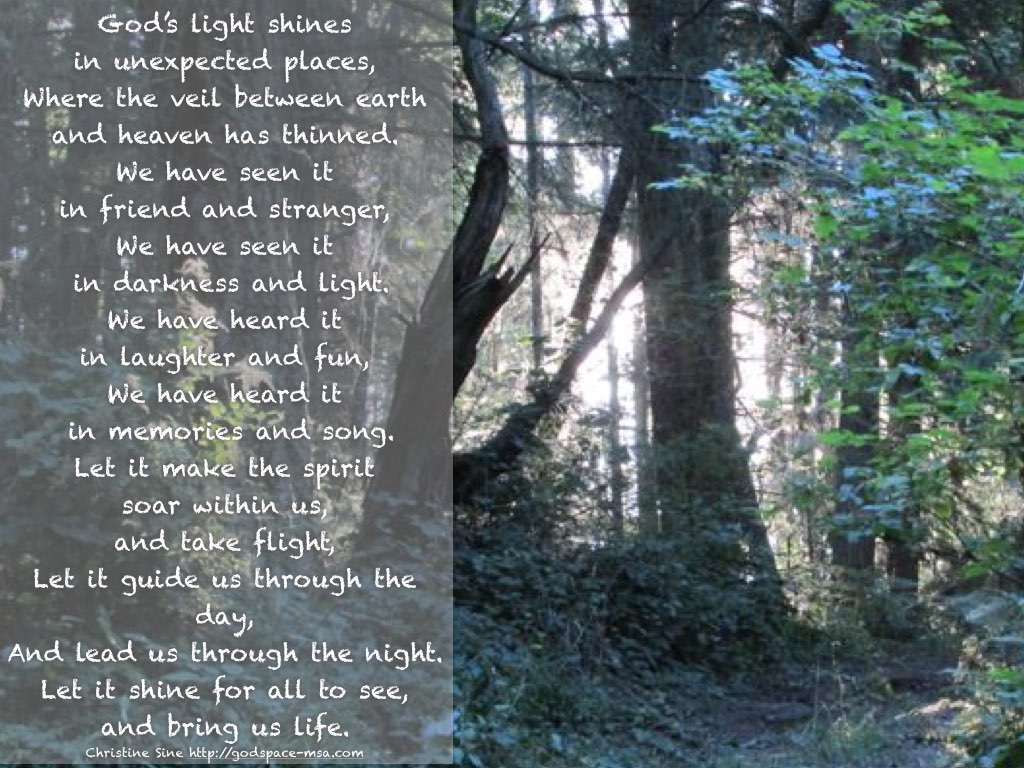
For Celtic Christians, God was a key part of all things natural and beautiful. They praised God’s design and creation of all things. All creation was seen as translucent with the glory of God shining through it. The hills, the sky, the sea, the forests were not God, but their spiritual qualities revealed God and were connected to God.
In some special places people felt a very strong connection to God’s presence. It was as though the veil that separates earth and heaven was lifted and inhabitants of both worlds can momentarily touch the other. These places are referred to as “thin places.”
When Tom and I visited Iona several years ago we were very aware of the special nature of this place. Columba’s beach, the Hill of the Angels, the Abbey cloister all have a wonder about them that makes one sense that heaven is but a breath away. The waves of the ocean seem to whisper Jesus’ words “I am with you always.” In this, as in any hallowed space and time, heaven and earth for a moment seem as one.
We return from thin places refreshed and renewed, aware that all of life contains thin places. Having seen the glimpses of glory in those sacred landscapes, we begin to see glimpses all around us. Soon the birds outside our window sing of the mystery we might have passed over in our busyness. The glowing sunset cracks open the door once more to the invisible realm, and as we sit in silence, we hear the divine rhythm of the ebb and flow of God’s love.
We cannot spend all our lives in these thin places but we can often return to them in our memory and in our imagination. When I am overcome with small tedious details and endless tasks, I hold my serpentine rock picked up on Columba’s beach, close my eyes and return to Iona. Sitting on Columba’s pebbled beach, I hear again the silent music of angel voices and the abiding presence of God’s love.
What is your response?
Reflect on the thin places in your own life. Where is a place that refreshes your spirit and opens the door to the threshold of God’s loving presence? Sit and imagine yourself once more entering that place. Experience God’s blessing and the wonder of God’s peace as it flows over you. In what ways could you enable yourself to enter that thin place on a more regular basis?
Now listen to this song – reflect on the lyrics. These too speak of thin places in our lives. How do you feel God would have you respond?
I am very grateful for the many creative suggestions that have been sent our way as regards the broken glass created by the vandalism at the Mustard Seed Village Site. We are planning to incorporate a couple of them into our Celtic retreat programme. (Just 2 weeks left to sign up) Such fun suggestions a big thank you to those that contributed.
For now we see through a glass, darkly; but then face to face: now I know in part; but then shall I know even as also I am known. (1 Corinthians 13:12 KJV)
Here are a couple of beautiful suggestions that unfortunately are too complex for us to use, but I thought you would all enjoy seeing them.
I love the Celtic prayers, especially those attributed to St Columba of Iona and often meditate on them and adapt them. The one above is probably my favourite but here is another that I have adapted.
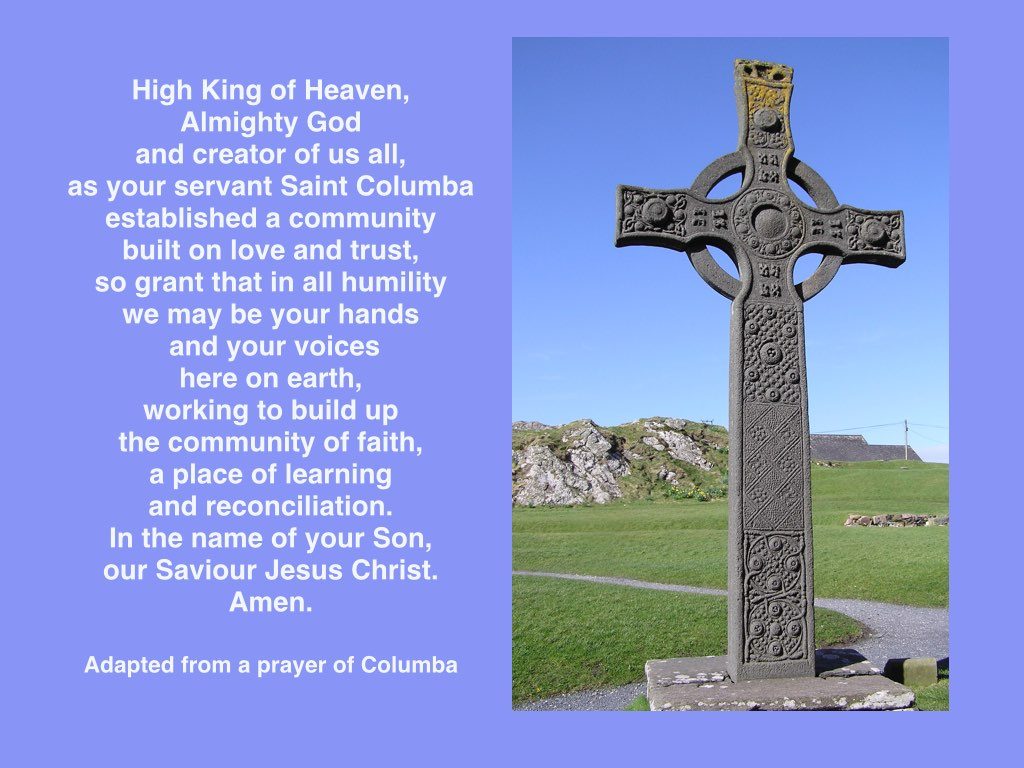
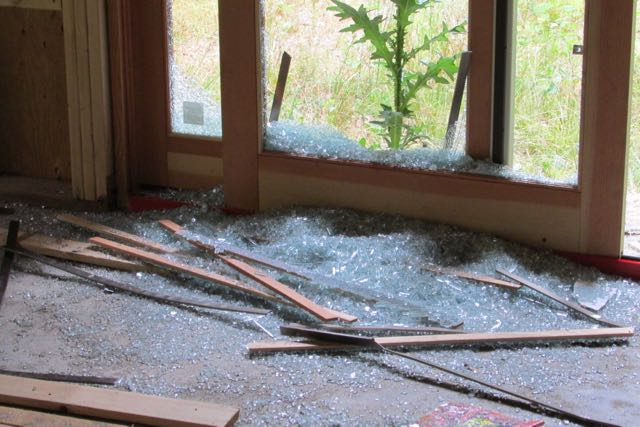
Last weekend Tom and I went out to the Mustard Seed Village with a crowd of volunteers to help get the site ready for our Celtic retreat in two weeks time.

Sweeping back the chaos
I was amazed at how quickly the messy chaos of weeds and broken glass could be transformed. In just a couple of hours of mowing, weed whacking and sweeping we were almost ready for the retreat.

Forrest and Kayra Inslee – our transformers of chaos into order
Now we have a creative task ahead of us and we need your help. Some of the shattered glass is still adhering to the window framework creating this rather beautiful pattern. We would like to transform it into an art piece, that flows out of reflection and meditation, but what? Our creative juices are rather limited in this direction and we were wondering what suggestions others might have.

Glass shards for attractive patterns
What do you think we could create that would refract or reflect the light and provide a hope-filled reminder of what has happened here? Your suggestions are appreciated.
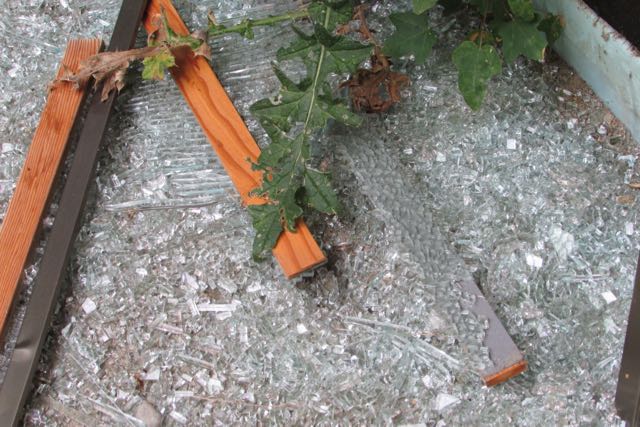
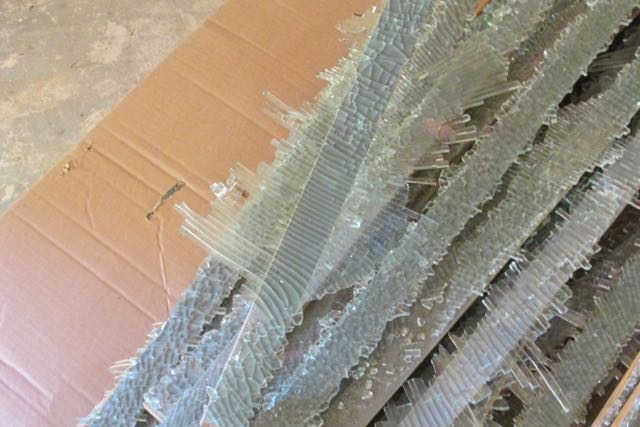
Perhaps you have suggestions for the myriad of small shards now collected into a bucket awaiting inspiration. We have thought of colouring the broken shards and creating a mosaic pattern on a clear background or imbedded in concrete, but what type of paint should we use? We don’t want to introduce toxic chemicals that create new polluting problems.
We need your help. Can you be creative for us and give some suggestions for an art project at our Celtic retreat.
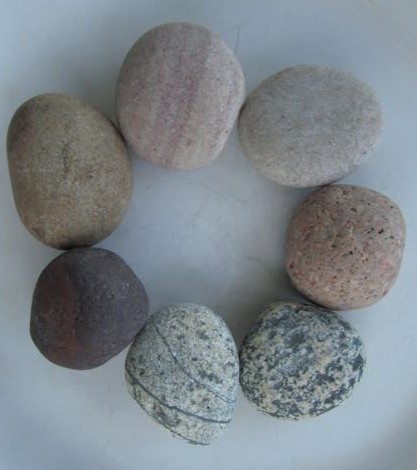
My river stones are beautiful individually, but they are even more beautiful when arranged to form a pattern. My initial thought was a rose, with the one dark stone at the centre. But it wasn’t long before I was rearranging them – an open circle, a question mark, a cairn, – so many possibilities. If I added more stones even more patterns could emerge. The variety was only limited by my imagination.
“God created by imagination”(Berdyaev) I thought and “Creativity gives birth to more creativity.” The life lived in step with the Holy Spirit is a little lot like the imaginative shaping of patterns with my stones. There is a need for discipline and structure. There has to be unity. But there is also freedom – an improvisation – to follow the call and leading of the Spirit.
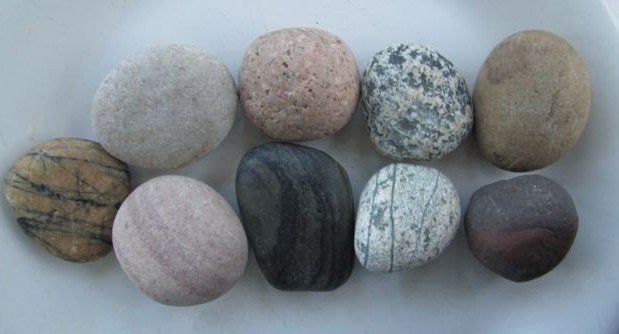
The longer I contemplated my stones, the more creative my imagination became and the more innovative the designs that emerged were. God must have incredible imagination to create a world that is ever changing and ever fresh with something new and awe inspiring to discover each day. Yet somehow in the practice of our faith we have learned to deaden our imaginations and stifle our creativity.
Don’t Confuse Discipline with Empty Ritual
One of the surprising things I notice as I read the Bible is that there seems to be more said about when to pray then about how to pray. We are told that Daniel prayed three times a day, Jesus often drew aside to lonely places to pray and of course spent days in the desert in prayer before he inaugurated his ministry but we are told little about what went on during that time. Yes we make lots of assumptions about what was going on. We know that Jesus was tempted by the devil, but I cannot imagine that this temptation was all that happened during his time in the wilderness.
Perhaps part of what happened while Jesus was alone in prayer was that he learned new ways to pray, new patterns that had the disciples hungering for what they observed … and of course out of that came the most enriching prayer of all time – the Lord’s prayer. But that too we have made into a formula.
What seems to be important for the people of God is that they pray regularly, bringing themselves into that place of intimacy with God where new beginnings can be imagined and new things can be birthed. So my challenge to all of us this morning is:
What stirs your creativity? How can you use the special creative tools God has placed within you to imagine new ways to pray and both draw close to the God of infinite creativity and respond to the needs of our hurting world?
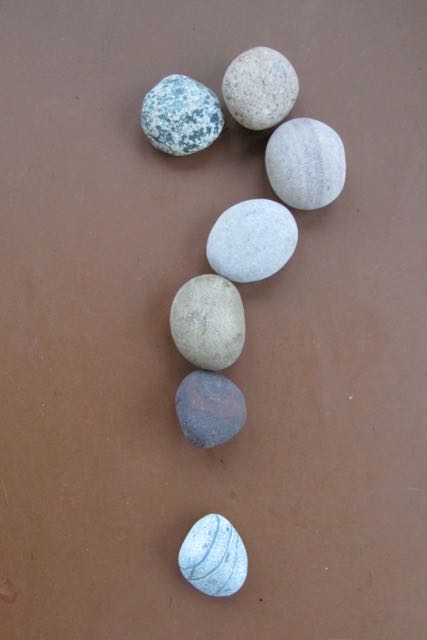
This post is part of a three post series of meditation on rocks. Here are the other posts’
When I got my collection of stones home last week I washed them. The colours in wet stones are much more vibrant than those in dry stones. But in order to keep those vibrant colours they must be kept wet, cleansed over and over. It is as though I have immersed my stones in the waters of baptism.
One of the things I love about going to an Episcopal church, is that whenever a child is baptized the whole congregation repeats its baptismal vows. As part of the service the celebrant recites a prayer of thanksgiving for the water, which includes these beautiful words:
We thank you, Almighty God, for the gift of water. Over it the Holy Spirit moved in the beginning of creation. Through it you led the children of Israel out of their bondage in Egypt into the land of promise. In it your Son Jesus received the baptism of John and was anointed by the Holy Spirit as the Messiah, the Christ, to lead us, through his death and resurrection, from the bondage of sin into everlasting life.
We thank you, Father for the water of Baptism. In it we are buried with Christ in his death. By it we share in his resurrection. Through it we are reborn by the Holy Spirit.[1]
Water is so wonderful – cleansing, refreshing, life-giving and life-restoring. In baptism, we rise up from the watery grave into the new life of Christ our Redeemer.
Throughout the Biblical story emerging from water always symbolizes a transformation from death to life, from chaos to new creation. We see it in the story of Noah and the flood and in the children of Israel passing through the waters that consume the Egyptians. We see it most vividly in the baptism of Jesus. He emerges from the waters with the dove, the loving Spirit of God hovering over him.
Through Christ creation is renewed. Water is no longer symbolic of the threat of chaos but has been transfigured by our loving God into a cleansing force that takes away the sins of the world. In the flood of Noah, sinners were drowned and wiped out. In the cleansing baptism of Jesus sin itself is drowned and the sinners are cleansed and made whole.
Water is essential to life, but unless it is transformed by the blessing of God, it creates floods, devastation and chaos. With the blessing of God however, it cleanses and gives life to the entire creation each day and in every moment. From the moment of our conception, we are wrapped in water’s tender embrace, but we must emerge out of the waters to find true life out in God’s world.
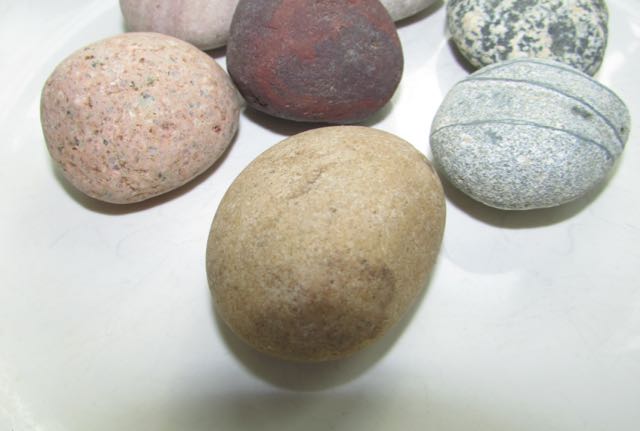
Blessing of water is symbolic, not just of life, but of transformation. When I wash my stones I can see blemishes in them that I was not aware of before. Some of them are permanent markings that penetrate into the structure of the stone, reminders of long ago cataclysms that disrupted the formation of the rock. Others are ingrained dirt, surface blemishes that must be scrubbed time and time again to remove them.
Every use of water transforms and renews. When we drink it we rehydrate dry and thirsty cells, we cleanse toxins from our bodies and we revitalize our energy. When we sprinkle it on our gardens it renews the dry and thirsty ground and gives life to every plant. When it rains from the clouds it refreshes and renews the very air we breathe.
Every use of water can be seen as a form of baptism, an opportunity to offer prayers of thanksgiving and appreciation for the gift of water and of life. We can so easily take it for granted, however missing the richness of these prayerful and sacramental moments that using water affords us, reminding us constantly of our covenant with God and reassure us of the cleansing of our souls that has taken place through baptism. Armenian Orthodox theologian Vigen Guroian in his delightful book of garden mediations Inheriting Paradise comments: When we bless water, we acknowledge God’s grace and desire to cleanse the world and make it paradise[2].
[1] Book of Common Prayer 1979 , 306
[2] Guroian, Inheriting Paradise: Meditations on Gardening, (Grand Rapids Mich, Eerdmans Publishing, 1999) 9
————————————————————————–
This is the second post in a series of meditations on rocks
Yesterday I published:
As an Amazon Associate, I receive a small amount for purchases made through appropriate links.
Thank you for supporting Godspace in this way.
When referencing or quoting Godspace Light, please be sure to include the Author (Christine Sine unless otherwise noted), the Title of the article or resource, the Source link where appropriate, and ©Godspacelight.com. Thank you!

